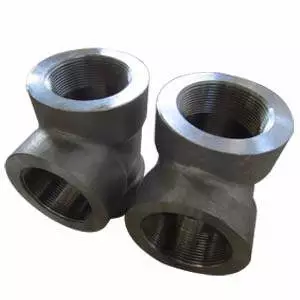A brief introduction to pipe tee, the most common pipe fitting
Posted: 05/28/2020 01:04:32 Hits: 413
A pipe connection with three openings is called a tee. Tees are widely used in the pipe network for conveying liquid and gas. Due to different media, the material of the pipe tee is divided into: cast iron, cast steel, cast copper, cast aluminum, plastic, glass, etc. The application of tees is also very extensive.
Introduction
As the term implies, there are three openings, that is, one inlet and two outlets; or two inlets and one outlet. As a type of pipe fittings in chemical industry, there are T-shaped and Y-shaped tees, equal or unequal in diameter of their three connections, with equal tees the most common, used to combine or divide fluid flow. Tees can connect three pipes of different diameters or identical diameters. Its main role is to change the direction of fluid flow.

Types
According to the material, tees can be divided into metal tees and non-metal tees. Metal tees are made of carbon steel, stainless steel, alloy steel, etc. For threaded tees, the implemented national standard is GB / 12459-2005. Non-metallic tees include PVC, UPVC, PPR, etc.
According to the connection method, it can be divided into two types: snap-on and threaded connection.
According to the shape, it can be divided into T-shaped and Y-shaped.
Structure
The metal tee has a main pipe and a branch pipe which is perpendicular to the main pipe and on the side of the main pipe meanwhile, communicates with the main pipe. A valve is provided at the corner where the outlet direction of the main pipe meets the outlet direction of the branch pipe. A circular valve plate is provided on the valve. When the valve plate is closed, the inner walls of the pipe cavities are sealed to each other. As a professional pipe fitting manufacturer, Landee simplifies the pipeline setting, saves the amount of pipeline parts and components, and facilitates the operation, which is convenient for pipeline branch maintenance and phased supply of each branch.
Introduction
As the term implies, there are three openings, that is, one inlet and two outlets; or two inlets and one outlet. As a type of pipe fittings in chemical industry, there are T-shaped and Y-shaped tees, equal or unequal in diameter of their three connections, with equal tees the most common, used to combine or divide fluid flow. Tees can connect three pipes of different diameters or identical diameters. Its main role is to change the direction of fluid flow.

Types
According to the material, tees can be divided into metal tees and non-metal tees. Metal tees are made of carbon steel, stainless steel, alloy steel, etc. For threaded tees, the implemented national standard is GB / 12459-2005. Non-metallic tees include PVC, UPVC, PPR, etc.
According to the connection method, it can be divided into two types: snap-on and threaded connection.
According to the shape, it can be divided into T-shaped and Y-shaped.
Structure
The metal tee has a main pipe and a branch pipe which is perpendicular to the main pipe and on the side of the main pipe meanwhile, communicates with the main pipe. A valve is provided at the corner where the outlet direction of the main pipe meets the outlet direction of the branch pipe. A circular valve plate is provided on the valve. When the valve plate is closed, the inner walls of the pipe cavities are sealed to each other. As a professional pipe fitting manufacturer, Landee simplifies the pipeline setting, saves the amount of pipeline parts and components, and facilitates the operation, which is convenient for pipeline branch maintenance and phased supply of each branch.
Post URL: https://www.landeepipefitting.com/a-brief-introduction-to-pipe-tee-the-most-common-pipe-fitting.html
Landee is a professional industrial pipe fitting manufacturer and be well accepted by customers all over the world, we has been producing Pipe Fitting for a variety of applications since 1985. welcome to access our website: https://www.landeepipefitting.com.
Previous: How to choose graphite composite gaskets?
Next: Standard Classification and Use of Carbon Steel Elbow
Next: Standard Classification and Use of Carbon Steel Elbow

